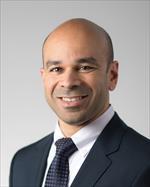Faculty Spotlight: Mandar Aras, MD

The emergence of new cancer treatments has been one of the most exciting advances in medicine, but some therapies can damage the heart. Dr. Mandar Aras, a specialist in heart failure, heart transplantation and pulmonary hypertension who recently joined the faculty, is excited to pioneer better care of these patients through the new field of cardio-oncology.
For example, immunotherapy harnesses the power of a patient’s own immune system to fight cancer, but it can also cause collateral damage – including myocarditis, which is an inflammation of the heart muscle. “There are a lot of unanswered questions about how to best treat such patients, and medical centers are starting to recognize the unmet need for oncologists to interact more closely with cardiologists,” said Dr. Aras.
He first became interested in the field from talking with his wife, Dr. Mallika Dhawan, a medical oncologist at the UCSF Helen Diller Family Comprehensive Cancer Center. “She tells me about new cancer therapies, and often has me look at EKGs,” said Dr. Aras. “Hopefully we’ll be able to develop a centralized mechanism for cancer patients at risk of developing heart disease while being treated with chemotherapy to have access to a cardiologist.”
Dr. Aras hopes to build research cohorts of such patients to better understand what factors put patients at risk, identify which patients need to be monitored, determine how to screen them, and how to best treat emerging disease while weighing the risks and benefits of continuing chemotherapy.
“As heart failure cardiologists, we’re very adept at multidisciplinary interactions with heart surgeons, social workers, nurses, pharmacists and many others,” said Dr. Aras. “Cardio-oncology is very similar – it’s long-term management of patients with multiple issues who need an interdisciplinary approach for better health.”
“Dr. Aras holds both an MD and PhD degree,” said Dr. Teresa De Marco, director of Advanced Heart Failure and Pulmonary Hypertension and medical director of Heart Transplantation at UCSF Health. “He brings with him outstanding clinical experience and the expertise for a promising research career in the field of cardio-oncology.”
Tailoring Treatments for Each Patient
Dr. Aras grew up in Pennsylvania and attended the University of Pittsburgh, where he earned bachelor’s degrees in neuroscience and economics, a PhD in neurobiology, and his medical degree. He completed his internal medicine residency at Duke University Medical Center and fellowships in general cardiology and advanced heart failure, transplant cardiology and pulmonary hypertension at UCSF.
“All roads end in heart failure, including end-stage arrhythmias, coronary disease and valve disease,” said Dr. Aras. Tracing back the path of a patient’s heart failure to its origins is critical to determining the best treatment. “We’re finding out that there isn't a ‘one-size-fits-all’ strategy,” he said.
Dr. Aras values the long-term relationships he develops while caring for patients. He often draws diagrams and shows them images on his phone to help them understand their condition. “Visual representations are very helpful, and they also slow down the conversation so I can see whether a patient understands what I’m trying to explain,” he said.
He enjoys measuring the heart’s pumping capabilities in the cardiac catheterization lab, managing all stages of their disease, and in some cases helping patients receive a heart transplant or a heart pump called a ventricular assist device. “I really enjoy seeing patients when they’re feeling better and living life like they want to,” said Dr. Aras.
Through his fellowship training at UCSF, he also gained expertise in managing pulmonary hypertension, a rare but serious condition characterized by high blood pressure in the arteries of the lungs which can also cause right-sided heart failure.
He appreciates that the UCSF Division of Cardiology has such prominent experts in every subspecialty area, including electrophysiology, imaging and structural interventional cardiology. “Everyone is very collegial here, and you can talk to the top people about options for patients,” said Dr. Aras.
Outside of cardiology, Dr. Aras and his wife are proud parents of a baby boy.
